Greetings fellow frugal weirdos! Welcome to Part 7 of our Frugal Homestead Series, which explores the finer points of how we’re going to reach our version of financial independence and move to a homestead in the woods in 2017 at age 33. Mr. Frugalwoods and I plan to buy 20+ acres of wooded land, likely with an existing home and outbuildings, in rural Vermont. While this series isn’t your standard personal finance blog fodder, it’s a uniquely personal endeavor for us and, it’s essentially what makes us the Frugalwoods.
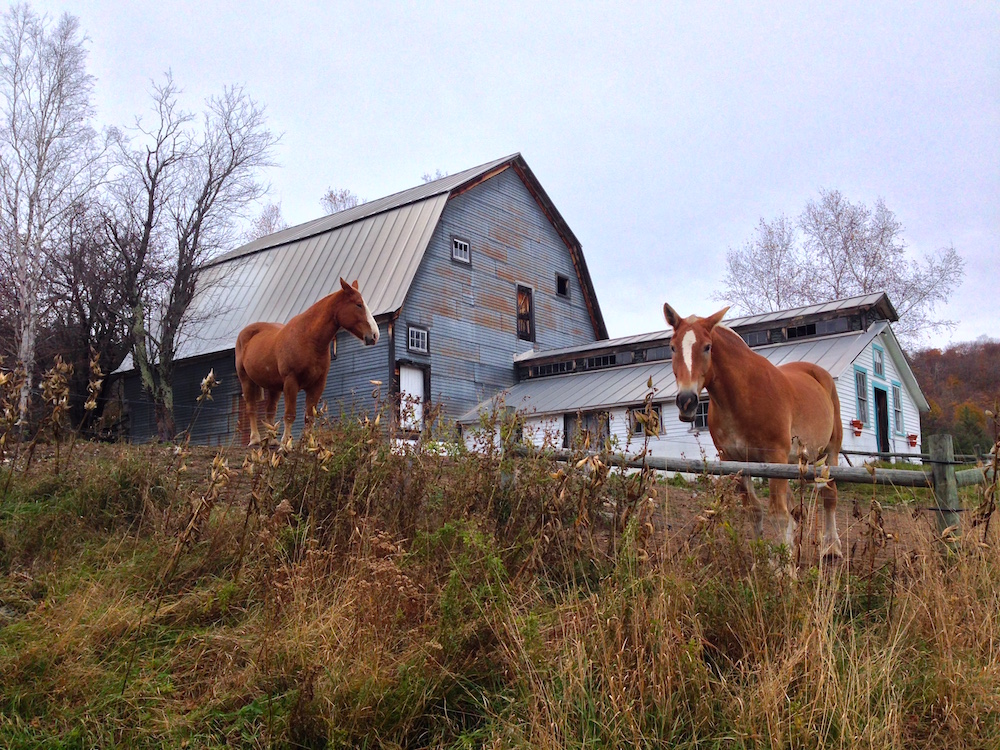
This past weekend, Mr. Frugalwoods and I ventured up to Vermont for one of our most favorite of activities: homestead hunting. We’ve been on the lookout for our early retirement property for the past 2.5 years and each trip north yields new ideas and knowledge about this life we’re embarking on. By giving ourselves a generous timeline in which to find our eventual homestead, we’re hoping to ensure we don’t feel rushed into buying a plot that’s less than ideal. With a target move date of no later than fall 2017, we’re optimistic we’ll be able to land on a worthy Frugalwoods home by then.
Patience and flexibility are both integral to the experience of buying rural land. There’s not much supply at any given time and the likelihood of finding the “perfect” estate is essentially nil. Fortunately for us, we’ve embraced the imperfection inherent to both extreme frugality and charting an unconventional mode of existence. That being said, we do have a number of requirements for the land we’ll buy, which include such factors as septic soundness, well safety, the sheer amount of land (we’re unwilling to go in for anything less than 20 acres), and the size of the house (we don’t want an enormous, inefficient abode that’ll be expensive to heat and maintain).
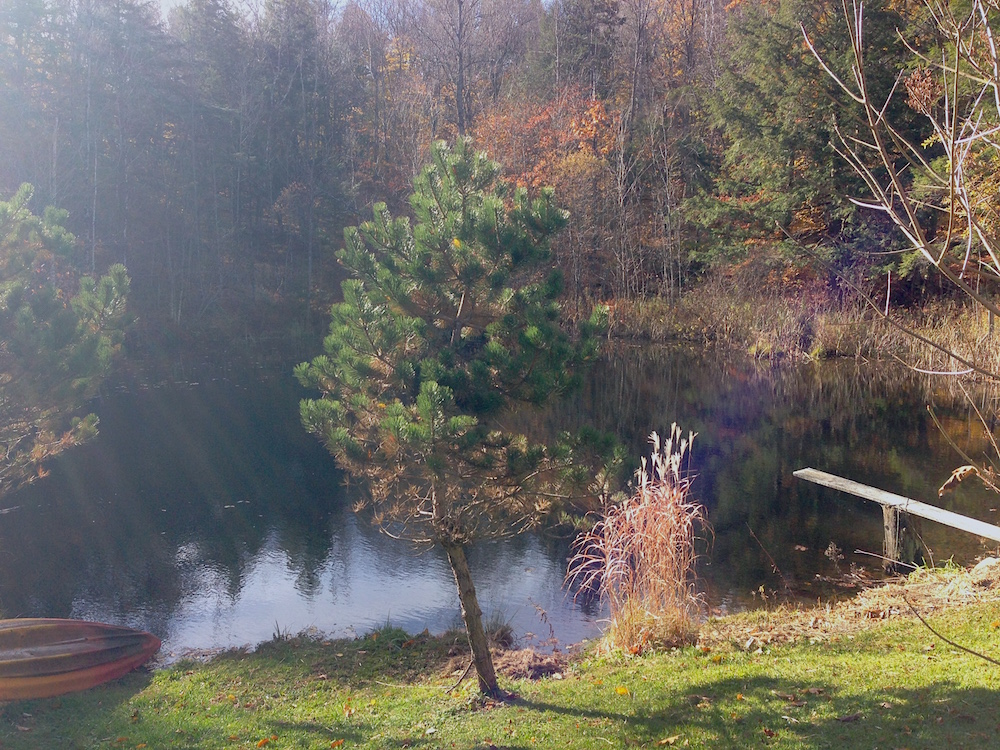
As we learned when we purchased our “city home” in Cambridge, MA three years ago, more research and more data make for a happy buyer. The more houses we see, the better informed we are about the market, what constitutes a good deal, and what we should expect when putting in our actual factual offer. Prior to netting our single-family home in Cambridge–which we scored for the lowest price per square foot of houses sold that month in Cambridge–Mr. FW and I visited upwards of 270 open houses. Why? We wanted to be well-educated buyers. And the more houses we saw, the more we honed our real estate savvy. Plus, it’s really fun to snoop around people’s homes and check out their decor.
Just as we research chest freezers, coffee, and Babywoods care and maintenance, home buying is no different. It’s not an emotional jaunt through whimsical worlds of paint colors and sentiments like “it just feels right”–it’s a heavily data-driven, investment-oriented purchase. And while we certainly don’t expect to see any great return on our homestead investment (rural land just ain’t gonna work that way), we also want to be smart about our decision and not purchase something that’ll be unsellable in the future.
And so, we set out on Saturday morning to scope out five different homestead properties in a slightly new geographic region for us: central Vermont. We’ve heretofore concentrated our search on southern Vermont, in the vicinity of Brattleboro, but we decided to expand to the White River Junction area. Having yet to find what we’re looking for in the south, we figured it couldn’t hurt to travel a tad farther north. The driving distance from Boston isn’t much greater, although the properties are a tad more expensive, owing largely to the nearness of Dartmouth College and the associated medical center, etc. Since we won’t be taking advantage of this geographic proximity per se–as we won’t need to hold down traditional jobs thanks to our financial independence–we’re not entirely sure if paying a slight premium is worth it. However, the resale value of these homes is likely a bit more robust as well.
How We Select Properties to View
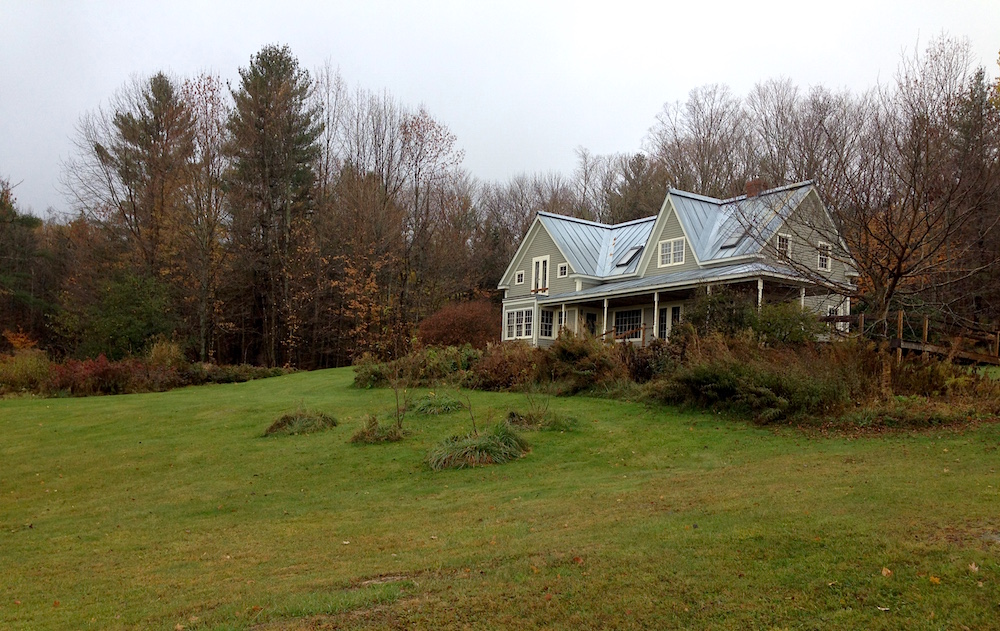
Organizing a homestead hunt requires a good deal more advance planning than simply popping around to open houses in the city. Indeed, there are no open houses in the country. Hence, one must map and route quite carefully. Good thing we enjoy doing our research! I will say that homestead hunting is not for the faint of real estate heart.
Since these properties are often a healthy distance from one another, it’s not possible to visit more than a couple each day. Thus, it’s important to prioritize and winnow down the list of possibilities in advance. Fortunately, the internet comes to our rescue and we utilize both Zillow and Realtor.com to make our initial assessments. We prefer the search interface of Zillow–plus it has for sale by owner listings–but Realtor.com features more comprehensive listings because it captures all MLS data. Between the two, we feel pretty confident we’re seeing every available property.
We input our minimum acreage requirement (20 acres), maximum price ($400K), and take a gander at what pops up. Our first pass is a quick screen to eliminate properties based on factors like:
- Too close to a busy road
- A home without power
- High-voltage power lines passing directly over the house
- Located in an obvious flood zone
- Unsuitable for year-round living
- If the house is either wildly too small or too large
- Entirely cleared land (this is Frugalwoods after all, we want woods!)
- A house in deplorable condition for the asking price
- Something bizarre or funky about the listing (ok I realize that’s kind of vague, but we know it when we see it)
We then click the favorite button for the houses we’re mildly interested in and from there, select our optimal candidates. Since we perform this ritual of identifying properties relatively often, we’re becoming accustomed to the nuances of evaluating land. Check out Mr. FW’s Frugal Homestead Series Part 4: Searching For Land for a more in-depth discussion of this thrilling topic.
Grouping by Geography (aka How Not To Drive In Circles)
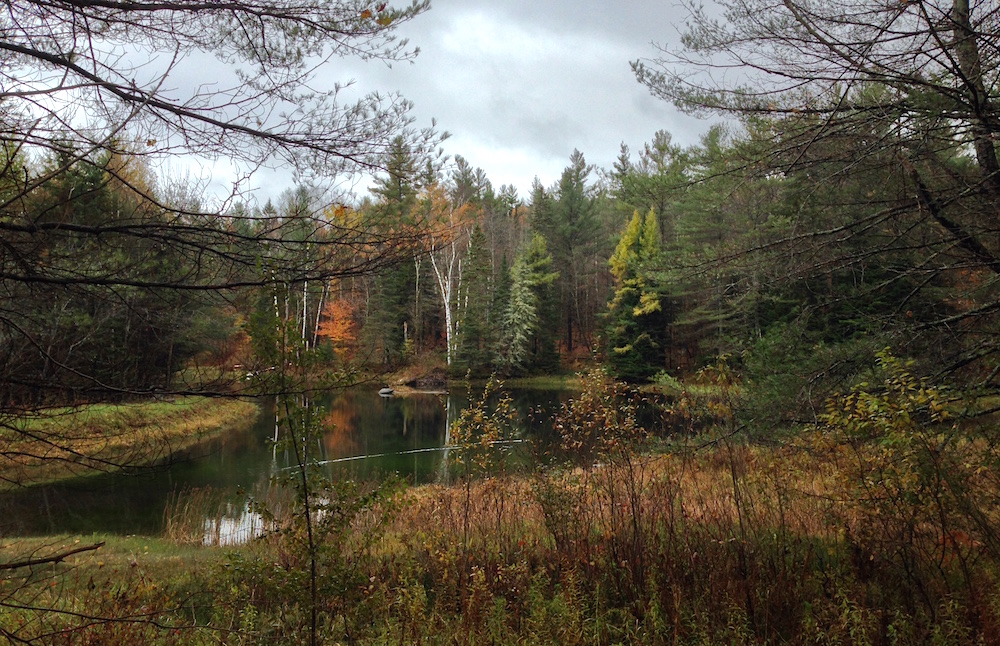
After we’ve identified our top choices, we plot them out on a map to determine the most efficient route for our grand tour. We run down the list, enter each location into Google Maps directions, then rearrange the addresses into the order that appears least circuitous.
Since we’ve searched for available properties via Zillow and Realtor.com’s map views rather than list views, we’re relatively assured they’ll all be in a roughly similar geographic region. However, plotting them out in Google Maps is our opportunity to discover any dramatic outliers located wildly far away from the rest of the pack.
Reaching Out To Realtors
Although we have a realtor we’ve been working with in southern Vermont… central VT is uncharted territory for us and we don’t have an agent yet. Thus, I simply contacted all of the listing agents for the properties we’re interested in directly. We typically like to allow for a full hour at each location to enable us to walk the land a bit and spend time assessing the feel of the property.
A full hour also provides leeway in case we get lost, or the realtor is late, and gives us the opportunity to ask as many questions as we can dream up. This particular trek also served double duty in allowing us to meet regional realtors to determine if we might want to use one of them as our agent for our eventual purchase.
On Getting Lost
Invariably, despite advance planning and mapping–not to mention our ever-present GPS, who is named Geraldine–we usually get lost for at least some portion of these expeditions. It just wouldn’t be a homestead hunt without a few egregiously wrong turns. The misdirection typically crops up when our directions and/or Geraldine instruct us to drive down a road that looks rather un-passable for the likes of Frugalwoods-mobile (who, by the way, rolled over 207,000 miles on this trip). Knowing one’s vehicle and not ensnaring oneself on a rugged road is a salient move for all concerned.
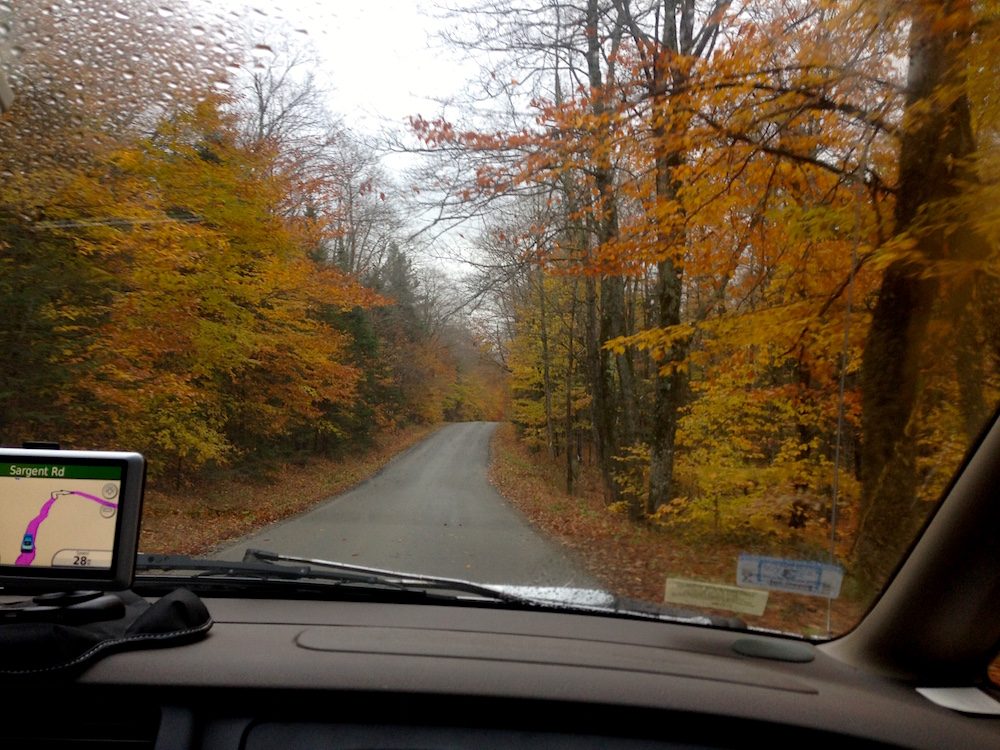
On this sojourn, we spent about an hour meandering through back road after back road attempting to wend our way to what passes for a highway in these parts. For a period of time, we just kept dead-ending at “roads” that appeared more fit for snow-mobiles than Frugalwoods-mobiles. There was also the issue of erstwhile roads, which now appear to be little more than footpaths leading into dense woods.
Additionally, our gas gauge began to lurk perilously close to empty just as Geraldine tried to divert us down yet another so-called road that is apparently now only traversed by horses. In the spirit of attempting to enjoy every experience in life, I decided to snap a few photos for posterity. If nothing else, I figured these would serve as our final images before the car ran out of gas, night fell, I went into labor, and it started to rain with a vengeance. Not that I was considering worst-case scenarios by any means…
But, we persevered and eventually succeeded in finding a paved road that led back to other paved roads (and fortuitously a gas station that doubled as a venue to gut and skin your fresh-killed deer). The whimsy of getting lost in Vermont is that everywhere you go is beautiful, rife with trees, views, mountains, streams, and farm animals, so at least being misplaced is always a scenic experience.
Overnighting It
Since Babywoods is due in just 4 short weeks, we decided to stretch this foray out and make it our little version of a Babymoon. Thus, we elected to stay overnight to make our house hunting far less truncated and much more leisurely. We usually perform these jaunts all in one day, so it was luxurious to conduct it over three.
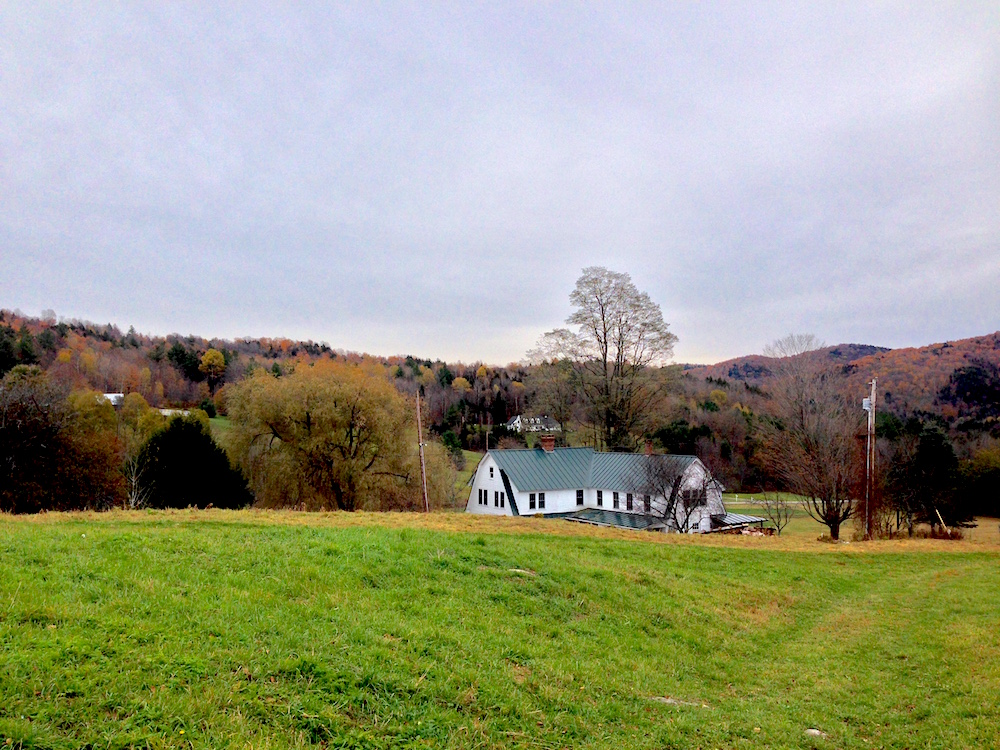
Anytime we do sleep overnight in Vermont, we try to find what we consider a “value-added” spot to lodge. AirBnB is our go-to for sourcing locations that offer the opportunity to stay with people who are living our dream: homesteading and running a small AirBnB operation. It’s a win-win since we get to savor a few days in a gorgeous, relaxing setting and pick the brains of our like-minded hosts.
This time around, we lodged at the lovely Stitchdown Farm in Bethel, VT where the inspiring young proprietors run a 300-acre vegetable, flower, and future sheep farm. It was both a delightful place to stay and also a wonderful chance for us to hear about homesteading from the source. I actually wrote this post sitting in their living room being warmed by a woodstove with a farm cat eyeing my lap and gauging if she could squeeze in between my baby bump and laptop. Verdict: nope.
The Properties We Viewed
On this specific trip, we visited five different properties spread out over two days. Our online research can only tell us so much about a homestead’s idiosyncrasies and unique features, so viewing in person is an absolute must for determining if we’d like to advance the relationship with a given home. Case in point: two of the five were almost immediately disqualified owing to a nearly mile-long, extraordinarily steep driveway at one and a rather unfortunate proximity to neighbors at the other. While we’d noted both of these drawbacks via Google Maps, seeing them in person reinforced and confirmed our suspicions that these two just won’t do.
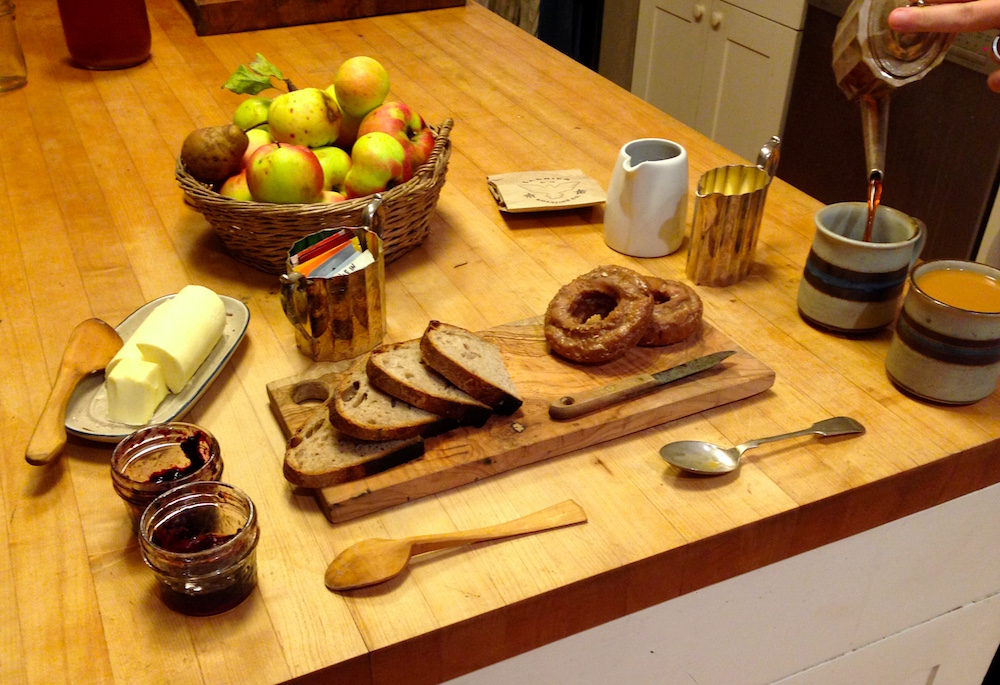
Of the remaining three contenders, the verdict is still out and we’re currently engaged in the engrossing practice of gathering more information. With rural properties, there’s almost no end to the amount of data one ought coalesce prior to making an offer. There are now forestry management plans to peruse, septic systems to inspect, internet availability to confirm, Frugal Hound suitability to consider, and much more.
It’s a fascinating process and I will say that it helps to view it as a hobby as well as a means to an end. If we hated exploring real estate and putting in the background research that’s required, I daresay we might’ve given up long ago. But, since we consider the journey nearly as enjoyable as the eventual purchase, its been a delightful and educational romp.
And on that note, I conclude Part 7 of the Frugal Homestead Series. Want to make sure you’re among the first to receive Part 8 delivered hot and fresh to your email machine? Sign-up in the Frugal Hound email box below and she’ll send you a message.


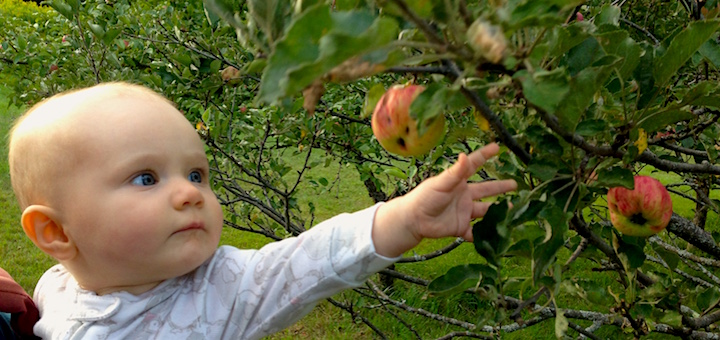
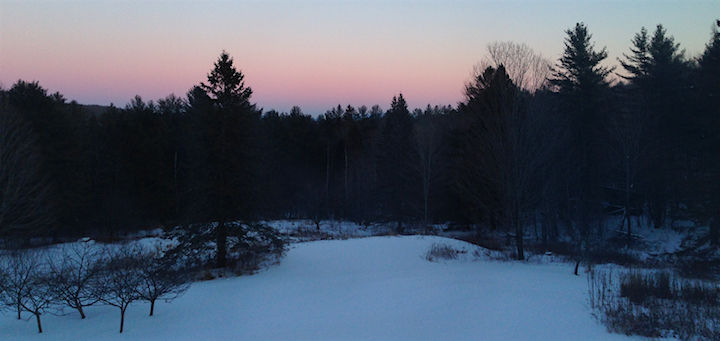
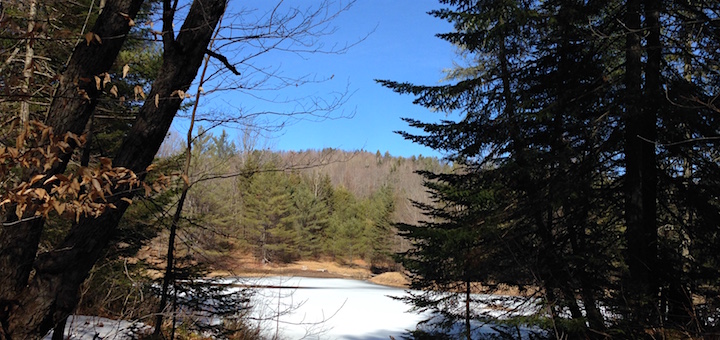
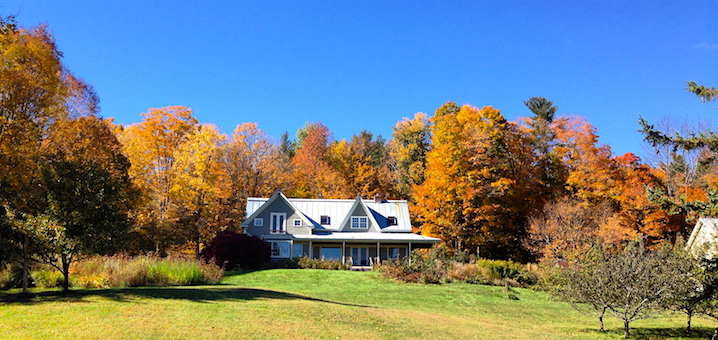
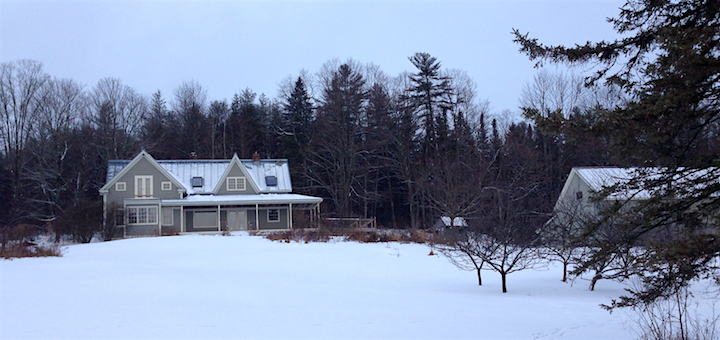

This sounds like such a fun adventure–except for the part where the road ended! I have to ask–were you a Little House fan growing up?
Oh yes, I was a huge Little House On the Prairie fan! I loved pretending to be Laura Ingalls Wilder and even had a bonnet to wear 🙂
I used to dress up like Laura Ingalls, too!
Those photos are absolutely stunning. I hope you’ll be open to visitors once you make the move 🙂 The home search for me is always a combination of excitement and exhaustion. When I stumbled upon the apartment I’m in now though, I knew immediately. Very much love at first sight.
We absolutely want visitors :)! You are most welcome! And, we plan to have an AirBnB cabin eventually too to allow for even more guests. Ahh yes, love at first sight can be so very true in real estate.
We bought our homestead (I like to refer to it as a “mini farm”) early summer of this year. We got a cabin in the woods on 19 acres. It’s about 13 acres wooded and 6 acres field/grass. It definitely needed work (new roof, wood burning fire insert, falling fences, etc.) but we knew about that. The big unexpected problem we’ve had so far is pest control.
It started with spiders. Spiders everywhere. You’d make the bed and a spider would run out. We finally got rid of most of them and then flying squirrels took residence in the attic. We got rid of eight of them and then last week we welcomed our first bat to the house which flew out of the basement, up to the second story and landed in my daughters room. Also, a hawk keeps trying to eat my laying hens! I’ve had to keep them fenced up for protection.
Just something to keep in mind once you move to your homestead 🙂 Other than that the move here has been FANTASTIC. I cannot even begin to tell you how much I love it. Becoming more self-sufficient is addicting and super rewarding. (And the kids love it too!)
Congrats on moving to your homestead–that’s awesome! And good luck with your retinue of pests!
Growing up rural, I can definitely relate to the pest problems! It’s a never ending, up hill battle…my dad has been on his property for 30 years and still hasn’t managed to eradicate the pests. I jokingly refer to him as the ‘caretaker,’ because of course they’re going to flock to the cozy, warm, weather-proofed building full of food. Good luck with your little guests 🙂
Brings to mind Mr PoP’s parents’ stories of when they were searching for their rural property some 30 years ago. His mom scoured the obituaries and dug through mineral rights records to eventually find their place (~10 acres with a creek and a barn, to which they added a big house built into the side of a hill).
Very cool! Yeah, it’s definitely an adventure to find a place. But it’s also a ton of fun!
Good luck on your homestead hunt! I have to admit I’m soo jealous. I first had the homestead dream while I was in university and it hasn’t faded yet. I am determined to build my own straw bale house on 5-10 acres. I suspect I’m still several years away from this goal but It’s great to read all the insider details of your planning and searching. I’m storing away lots of tips and ideas for the future!
So enjoyed this post and your land-hunting adventures. I especially liked your reference to paved road vs. whatever else kind of road. Upon my move here, I very quickly learned that many roads are not paved and people designate their vocabulary to explain such; i.e. give directions, turn on dirt road, back onto paved road, etc. Coming from a big city, I found that funny. I also learned that people prefer the dirt roads…more conducive to country life. I’ve come to agree with them. Another story….driving around here, I looked at the GSP once and exclaimed…”there’s only one line!” Nothing else on the screen! Be careful here though, it’s easy to get lost and turned around, and when it’s dark…it’s pitch dark. But I’m sure you saw that already. Continued best wishes on your search!
My sister-in-law gave us funny directions to her rural property: proceed down the hill and turn right at the pregnant cow
“turn right at the pregnant cow” HAH! Yes, that’s very much how we feel driving these roads sometimes :). It’s certainly a good education on navigation. bev–you’re so right, it’s easy to get lost, especially when you just keep dead-ending in non-roads!
Here in NW Missouri, Google maps is not so accurate, so we get on that county’s GIS maps to see property boundaries and such. There is usually a link on the county’s website. If you haven’t tried that, it may be helpful.
We definitely use GIS maps for property boundaries–they’re a great resource! Often, we combine those with geospatial overlays of town parcel PDFs. Always an adventure to try and figure out boundaries!
I have been gleefully following your search. When we were looking for our retirement home (early retirement, but not as early as yours) we too spent a few years looking in various communities. My tip — once you settle on an area you’re interested in, subscribe to the local paper. In one location this clued us in to a massive development on the horizon, (not to mention constant petty infighting in the local school district) which led to us crossing that location off our list. One of the reasons we chose the area we are in now is that the nearby small town had a very vibrant community vibe and lots of opportunities for volunteering with organizations we enjoy, plus entertainment such as free or low-cost lectures, fun festivals, a community theater, etc. The local paper was the best way to learn about all of this. Also, check in with your local County Extension Agent (sometimes called the Agricultural Extension Agent). These folks offer tons of free resources on everything from managing your woodlot to what varieties of vegetables and fruit trees do best in your area. My brother wanted a pond on his rural property and the Ag. Extension agent drew up a free plan for him, while I have taken advantage of a program with our local Extension Agency to buy low-cost tree seedlings for native fruit trees and berry bushes. I can’t wait to see where you end up.
What a great tip! We’ll do that!
Great points–thanks for mentioning this, Cindi! That’s something that we do as well. It’s really important to us to learn as much as we can about each area we’re looking in, so we enjoy doing all of that regional research. I’m actually calling school districts today to do more vetting work :).
I used to work for Michigan Education Association. We staff knew which schools were standouts in our state, and it didn’t correspond particularly with how much money the district had to spend per kid. Often it was the people staffing and administering the system. If you can talk informally with someone at the association level, you might learn some things that would help guide the regions for your search. Just a thought. What a grand adventure — your search. Thanks for sharing. I always appreciate your posts, not the least because of the quality of the writing.
Thanks for the tip, Leslie! I had a great conversation with someone at one of the elementary schools yesterday and learned a ton. I shall see about calling the education association too. Never hurts to gather more data :)!
Friends found their “piece of land” this summer… after casually looking for 20 years. I am sure that yours is out there 🙂
I’m hoping so :)!
Look at those pictures! I want to visit Vermont! I want to visit Vermont!! I WANT TO VISIT VERMONT!!!
If you liked the pictures, be prepared to move here once you visit! Pros and cons to everything, but it is stunningly beautiful here.
Yes, I agree Bev! The 1500s need to move to Vermont. Preferably next door to wherever we decide to buy ;).
STOP TEMPTING ME!!! 🙂
Have I mentioned you could own your very own little mountain in VT and build your very own hiking trails on said land ;)?
I love reading about your property search! I am looking to buy some property in the near future and the process seems so difficult!! I
Beautiful and peaceful.
We bought our current house over 8 years ago and have no intention of moving any time soon. We would get daily emails of all the houses being listed and after we bought our house the realtor stopped sending the emails and I said, please keep sending them. I have no interest to move, but I just want to keep up with market trends and see what is out there. I do the same with jobs. I have no interest in leaving, but I like to see the trends and research and educate myself. A little extra education never hurt anyone. Amazing pictures!
I got so excited when you said Central VT because I grew up in Central VT, but you were much further south than my stomping grounds. Sounds like a very nice little baby moon/property hunting adventure!
Oh neat! What town did you grow up in?
We will be doing the same just prior to Thanksgiving in Sedona, AZ. Like you, we are a few years out.
One major consideration is taxes plus HOA fees. We will create a “future budget” increased 3% per year. The property taxes and HOAs seem low, but what are we missing?
Taxes are about $7,000/year for a flat worth about $360,000 in Houston, dues are $6,000/year-cheap for here.
We are working with an agent I found through Dave Ramsey called an ELP-endorsed local provider who has set up our own MLS portal with more detail than realtor or Zillow-though we love and use Zillow too.
Another consideration-renovations. We are almost twice your age and could do minimal rennos. We would pay a lot more for move-in ready than a fixer.
The number of places you guys have looked at is mind-boggling! I’m not sure how you can still see straight after seeing that many! But, what’s important is that you find the place that’s right for you, and that you’re happy with the process. In our case., We generally found our homes pretty quickly, and have been happy with them, so to each their own! Good luck finding your dream homestead!
New England is where I was raised, and I love scenic Vermont and New Hampshire for sure, especially this time of year. Great job with the due diligence. If you find a property that you know is “the one” will you jump on it?
Yes!
Congratulations on continuing the search! It all sounds very exciting & I can’t wait to hear about the final decision 🙂 It’s crazy how soon Fall 2017 is—time just seems to fly by. Apart from extensive research, what other tips do you have for first time home buyers? Much like your house in Cambridge, I live in a very expensive real estate area (San Diego) and feel slightly overwhelmed about where to start.
I have our first time home buyer’s tips in this post about going to open houses: Our 12 Tips For Visiting Open Houses: We’ve Been To Over 270. Best of luck to you :)!
Thanks for the link! I can’t wait to read it and devour all the frugal tips 🙂
Did much the same process years ago when buying the family farm – many field trips and many times lost (this was decades before GPS) and looked at many unsuitable places but the end result was success (it took 3 years btw).
As Stefanie noted when you find the one you’ll know and you’ll have to act usually reasonably quickly so have your powder dry – i.e. your financing or whatever you’re using to consummate the deal.
Also be aware that even the “perfect” place is going to reveal some warts after its yours – law of the universe.
Another strategy a friend used was to approach the owners of a likely looking place and simply asking if they would be interested in selling to you (privately) – it presents a idea which may blossom – of course this should be very low key and friendly. The folks may also know of someone who is thinking of selling and haven’t yet been nudged into acting. There are usually many more opportunities out there than those listed on MLS or Zillow.
Happy Hunting!
Very true that the “perfect” place doesn’t exist :). All about finding somewhere that meets most of our checklist. Glad to hear that you were successful in finding your farm! It’s certainly an interesting process to scope out rural land.
Beautiful pictures! Mrs. DisIndebted and I love reading about your homestead plan! We are working on our own, far less picturesque, real estate plan to help us pay our debt and fund our future goals – which someday may include a cabin next door to y’all out in the White Mountains of NH. You’re 5+ years ahead of us on the early retirement route. Please keep up the great posts to help us stay motivated!
Ahhh the White Mountains are so beautiful! That’s an exciting future you have planned :)!
Those pictures make me seriously want to visit Vermont in the fall. It looks SO different compared to here, and I miss that fresh, crisp, fall view!
Gorgeous “lost” pictures! I love these posts because I’m somewhat jealous that your “next life” includes something so tangible you can actually decide upon. You’re searching for that perfect place to lead your next life. Ours is much more transient… so doesn’t involve searching homesteads… but each time you post a homestead search, I do mental “next life location” search on AirBNB for extended stays with our kids!
Would suggest visiting properties several times in dead of winter and also in mud season to gauge navigability and safety of roads—and costs of clearing/snowplowing those roads after big storms that drop branches and trees. Have been in life-threatening situations in winter on steep Vermont roads that looked totally innocuous in fair weather.
Would check the sight lines of homes with regards to the bullet trajectories of hunters. People will hunt on your property. Good to figure out where the deer will gather and whether your dwelling and yard might be the backdrop for errant shots.
Something to be said for living within an hour of a college town for entertainment that would ease late-winter cabin fever.
Don’t rule out Northern Vermont using Montreal as your urban hub instead of Boston.
Regarding size of your property, remember that Elliott Coleman and Barbara Damrosch grow $120,000 of crops annually on 1.5 acres.(http://www.nytimes.com/2012/02/23/garden/living-off-the-land-in-maine-even-in-winter.html)
Good luck!
Blue Dog
Hey Blue Dog–thanks for the tips; it’s great to hear from a Vermonter! We include driveway and access road suitability as one of our major vetting points with all the properties we consider. We actually ruled out one property this weekend based on the length and difficulty of the driveway alone (and have ruled out others due to limited/treacherous access roads). Good point on the hunting too–we’ll have to determine whether or not we want to post our land.
Our wishes for acreage are actually more for the woods than the crop-growing ability :). Since this’ll be our big move from city to country, we’ve decided we want a significant amount of our own land surrounding us. And, great point on living close to a college town–we drove into White River Junction and were pleased to see how quick of a trip it really is. I do like having that hub within close proximity. Thanks again for your thoughts!
I’m surprised there are so many properties to look at. When i think of 20 acres, I would think there just wouldn’t be that many choices. And to see the pond on the property. Oh my, I’d die and go to heaven if I had something like that.
But I’m a warm weather So Cal boy now. Relatives are from New England. In fact, in Saxtons River there’s an ice skating rink named after my uncle.
I like the idea of looking at lots of properties. I tend to be impulsive even in my real estate purchases but it’s always worked out for me.
Good luck on your purchase and boy would I love to come and visit in a few years when you’re settled in.
Yeah, you’re right that there aren’t a ton of properties that fit our criteria at any given time, which is part of the reason why we’ve been looking for several years now without making a purchase. Patience is definitely key in this search :)!
This makes me laugh because of the GPS. GPS’s are sometimes great, and sometimes, not so much. We wonder whenever we drive through LA if it really knows what it’s doing – in that case, trying to avoid traffic.
Our funny story pre-GPS is via MAPquest. Back in the 90’s, you either bought a map book (which we did) and / or went on line to Mapquest. We took a 10 day trip around the Southwest – Coastal So Cal to Grand Canyon, to Sedona, to Santa Fe, to Alamogordo, to Tucson, to Joshua Tree to home. Mapquest told us the way! We camped in a couple of places, hotel’d a couple of places, and stayed with family/ friends in a couple of places.
The problem was from Grand Canyon to Sedona. We drove past the big sign to “Sedona” because of the Mapquest direction to take “Schnebly Hill Road”. Well, we get there and get off the highway and it’s nothing but dirt/ mud with a sign that says “must have 4 wheel drive next X miles”. Well, we aren’t dumb so we got back on the highway and took the long way around. Using the map.
I’ve so enjoyed watching (reading?) this series unfold. My favorite part, besides the lovely photos, is your description of the journey being as enjoyable at the destination. Can’t wait for part 8!
Living in western Mass close to the vt border I love when you have these posts. Vt is absolutely fabulous and I do hope you end up somewhere in southern Vermont. Though you are smart to expand your research area…
‘Was recently in Brattleboro and Wilmington for kid related activities and driving on some roads that I was unfamiliar with but 3 times i had to ask for help finding our location(2 separate trips!) and the “ask the Vermonter” worked much better than my phone for directions!
1st time- Jacksonville country store
2nd-up the road from the high school in Wilmington
And lastly somewhere near the Brattleboro high school….
Everyone was super friendly and I never felt uncomfortable asking…
Good luck to you.
Ahh yes, the old “ask a Vermonter” is a good tactic! We were about to try and find someone’s house to drive up to and ask for directions, but fortunately found our way out to the main road :).
Feeling compelled to asked whether you seen any smaller acreage pracels that abutt protected lands? Although you might be limited in the usage of the protected lands, I.e. no felling timber, walking and (usually) hunting are allowed. I’m thinking state forest and protected games lands here.
Great question! We have indeed looked at parcels with protected lands bordering, which would definitely be a plus for any property in our minds. What we’ve determined over the course of our 2+ years of searching is that we really want to own at least 20 acres of our own. We’ve looked at smaller lots and, after walking the boundaries, just don’t feel that those are quite what we’re looking for. We really want to have the ability to manage and steward our forest and build our own hiking trails, tent platforms, etc throughout the land. It’s definitely more expensive the more land you buy, but we’re willing to pay more to have the amount of land we’re dreaming of. That being said, abutting protected lands would be ideal no matter the plot size :)!
We broke ground on our place in East TN in June. We knew which county we were going to live in, so that helped the search greatly. But we still looked at Zillow & consulted our local realtor when we were looking for land with houses. In the end we decided to build with what worked best for us & will have a great view of the Smoky Mountains.
One of your filters is “house without power”. Seriously, there are houses without power in 2015? That must be some real rural living!
From the pics, it looks like a great weekend to get lost with all the wonderful fall colors on the trees. We’re just now getting some color in Raleigh.
Yes! There are houses without power :)! They’re mostly seasonal hunting cabins/camps masquerading as houses though. Easy enough to rule out.
Wow, wow, wow, love the photos. Looks like a great trip minus the getting lost part. I’ve been lost once or twice on some back roads in the middle of no where, depending on how much gas you have it can be fun 🙂
Cool, sounds like you had a productive trip! And I think the only way you can get to the point where you’re not getting lost in a given area is to…get lost there a bunch of times. 🙂
I grew up on the NH/VT border, on the NH side, and I have to say, I always had a little bit of an inferiority complex because VT seemed sort of…better, in a lot of ways.
(But don’t get me wrong, NH, I love you!)
Loved reading of your search! Bought a block and had an A Frame built! Retired there early but not as early as you! Grew vegies, fruit trees, flowers! Had our cat and dog and many visitors! After 7 years considered it wise to move to a larger country town with more facilities also less work! Living life is a joyous adventure a lot of the time! Best wishes to you all! Love reading your blog! Australian lady!
Sounds wonderful–so happy to hear you enjoyed your time out on the “farm” :).
Ooh, that sage-green house looks beautiful!
I want you both to find a nice place so we can come stay in your Air B&B yurt!
Haha, yes! We look forward to opening up the yurt :)!
I probably haven’t seen all your homestead articles as I came on to this only recently, but I do have a question. Now that there is a baby in your very near future – have you thought about school? I know – stupid question in a way – you both appreciate the education you received. So, is it homeschooling? Or, will it be town school? If it’s town school, are you researching the merits of different schools before you settle in?
As for hunting for a homestead – I didn’t, but I landed here. I’ll just say that – as much as I love this land, the quiet and yet the energy it takes to maintain – I wouldn’t have it any other way unless my children were still young and school age. Schools in the country are abysmal I’ve found. Simple things I took for granted just aren’t being done. I found this out when farm neighbors tried to get help with a child who has dyslexia. Lucky for both of us, while in CA, I was afforded the chance to go with my children to U of CA for classes, learning how to correct the this disabling condition. The two who were diagnosed with dyslexia, have overcome it and don’t even remember when it was a problem – thanks to a great school system. So, I was in a position to help this family but without me – they couldn’t get any kind of answer at school and they didn’t even know what was wrong with their child. I knew where to go, how to get help.
The other thing I learned living out here in the country is this – I wanted to support local business/doctors/dentists, etc. HOLY TOLEDO!!! This was the wrong thing to do in the case of medical and dental. RESEARCH !!! You may find a good doctor and/or dentist but don’t count on it. It doesn’t matter how many degrees you have, they (medical/dental) classify you as “country” which translates “stupid, ignorant, uneducated, a host of other adjectives. I needed a crown repaired. The first dentist I went to wanted to pull my tooth! I asked if it was that bad. He said “well, you could lose a tooth or too, no big deal.” I almost ran out of his office. I went to another dentist in town. He wasn’t going to give me happy gas. I asked if everyone was brave around here and didn’t require anesthesia of some kid. He just looked at me and said “It only hurts for a minute.” Well, in my book, a minute is too long. I realized what was going on – it really was a different kind of ism I never knew about – countryism! Okay, I made that up. As for the medical?
My house mate had an anaphylactic shock due to the swarming ladybugs. I raced her to the hospital in town. No time for an ambulance. The idiots in the emergency room couldn’t get a breathing tube down her and had to life flight her to Nashville. While trying to jam a breathing tube they damaged her vocal cords PERMANENTLY in the process. Now, I’m sure there are good country doctors SOMEWHERE…and there are good country dentists SOMEWHERE. My suggestion is to do your own research but please live close enough to somewhere you can get help if you need it. Otherwise country living is a dream…I hope I didn’t make you think it is a nightmare. It isn’t.
Great questions! We perform extensive vetting research on any location that we’re seriously considering, which is largely why we’ve selected Vermont in the first place. You might enjoy a few of the earlier posts in the Frugal Homestead Series as they discuss our considerations of several of the factors you mentioned, especially this one: Frugal Homestead Series Part 3: Why Vermont?.
As we’ve always known we wanted to have kids–and raising them on a homestead is one of the primary reasons why we’re making this move–researching schools is a key part of our approach. It’s another reason why we’ve selected Vermont. We plan to send Babywoods to public school and fortunately, many of the county schools in VT are quite good. Another factor in this decision is that we’ll both essentially be stay-at-home parents and so will be able to supplement and augment her education in any ways that we think are needed.
Plus, our proximity to major metropolitan areas–New York City, Boston, White River Junction, etc–are other reasons why this area of Vermont is ideal for us. We’ll be able to expose our kids to big city culture within just a few hours of driving. Ideal in our book :)! It’s all a balance and it’ll certainly be a different life than the one we lead in the city, but there are myriad reasons why we’re not keen to raise kiddos in the center of the city either.
I grew up in Rutland (not the most rural of Vermont cities but a great jumping off place to explore the rest of the state).
We tend to summer with my parents in Vermont. It’s a very nice break from the Las Vegas heat and hub-bub. I’m due with my third daughter around the same time as you. Maybe we’ll see you one summer for a playdate 😉
Oh very cool! A summer playdate would be lovely 🙂
I’ve some great October camping trips in central VT around Killington and Groton so I’m envious of your foliage photos. Wish I could be out there right now! Blanche & Bill’s Pancake House near Bridgewater, The Calvin Coolidge historical site… There’s so much great stuff up there. And just think of how close you’ll be to Sugarbush Farm and their 7 year aged cheddar!
I don’t think you mentioned, but I know in NV its common when looking for land to consider if water rights come with the land. Plenty of people have cows, horses and grow hay. But without water rights, they’re not allowed to use the stream that runs right through.
Water rights aren’t a thing in Vermont, but definitely something for folks to consider in other parts of the country–especially out west!
When we were looking for our year round cottage to live in, we also ruled out houses that were too small or with the steep driveways (those are not practical in climates that get snow). We saw some pretty interesting things I must say!
Happy hunting!
Oh yes those steep driveways can be a deal-breaker! We’ve ruled out a few places based on the length and pitch of the driveway alone! And there certainly are a lot of “interesting” properties out there 🙂
My husband and I bought our first place when I was 19. It was a wooded 6 acres. Beautiful place. Park like……felt like we were on vacation everyday……but the downside of being in a wooded area, was no beautiful sunsets and sunrises. After 13 years of that we decided to buy our dream homestead. We bought our 50 acres a couple of years ago. It still has a wooded area (15 acres), but we also have flat, fertile, usable land and AMAZING sunsets. So my advice is, don’t hide yourself from the light. Woods are great, but mornings and evenings are so much more beautiful with a view 🙂 Try to get a little of both.
I wondered if you looked at the 638 Bingo Road Rochester Vt homestead. It has an old farm house and some out buildings, 24 acres of land ( probably half in fields and good green areas, not sure) abutting the National Forest. And is in the very cool town of Rochester in an extremely scenic area by the Bingo Brook not too far off Rt 73. . Has never flooded there in the past 30 years I’ve been visiting this area, even during Irene. Lots of hiking, camping, bicycling, skiing and snowshoeing trails available in the Chittenden and Moosalamoo National Forest recreation areas near by, and biking / hiking trails about a mile further down the road from the farm house. Might be of interest to you, so thought I would share as you were in the adjacent town of Bethel, Vt.
Should say ” good growing areas”
Thanks for sharing this! We haven’t looked at that property before, so I’ll check out the listing. We’re always on the lookout for properties that fit our criteria–many thanks for passing this along :).
As a Bostonian who moved to a rural part of the White River Junction area, I say you should go for it! My husband and I love it here. We are gradually learning traditional homestead skills and becoming more self-sufficient while also keeping a 9-5 job. The area is beautiful and remote but we also like knowing that Dartmouth-Hitchcock Medical Center, great hospital, is nearby.
I am curious where the 20-acre requirement came from. How did you determine that was the minimum amount of land to meet your needs?
Oh very cool! So glad to hear you’ve enjoyed the transition! What town are you in (feel free to email me directly if you’d rather not share publicly)? We decided on 20+ acres after looking at a number of parcels that were smaller, walking the boundaries, and just not feeling like it was enough space for what we want. We realized that since we’re making this move to immerse ourselves in the woods, we really want at least 20 acres of our own land surrounding us (and ideally more). On the land, we want to build hiking trails, tent & yoga platforms, cabins, gardens, and Mr. FW is very interested in sustainable forestry management. The stewardship of a larger swath of land is part of what we hope to take on with our homestead life.
I want to visit like, tomorrow. The trees are simply gorgeous!
You’ll get there, my friends. Having been through this before, I can tell you that you’re doing all of the right things. Hang tight – THE property will appear on the scene. 🙂
Wow, that lake picture! I’m ready to put in a bid. It is stunning.
I went to Dartmouth College and love Hanover and the surrounding area. I think you’d have great Airbnb prospects there, too–especially around graduation, when the local hotels all charge $400/night and require three-night minimums.
Best of luck with the search!
Oooo good to know, thank you!
Really enjoyed this article. I guess “homestead” has the same meaning as “smallholding” does? Homestead is a prettier word.
We share an aspiration though having already bought a couple of acres one thing I didn’t consider was how wet the land might get and if your soil is clay and your climate damp…
I guess the key is to buy 20 useful acres?
Hope all goes well with the arrival of Babywoods.
All the best
Smallholdingsister. Xxx
Great content guys, My wife and I are searching for rural properties as well ! I’ve found some very good FW’s tips in your articles. Mr. Frugal, I haven’t find any article explaining your finance after retirement nor how do you plan to finance the 20+ acres of land?
Hi Erik: good luck on finding your dream property as well! For more on our financial model for the homestead, you can check out Frugal Homestead Series Part 2: Here’s The Budget. Cheers!
Great series guys and I’m really enjoying reading about your search. I might see how UK places compare, I would imagine less land and a much larger price tag :/
Great Post!
We’re looking for almost the same property as you but a little further north and we’re a bit newer to the search. The posts in this series have been invaluable. Thank you!
One thing we’ve learned is that taxes can be a big consideration. We’ve increased our minimum parcel size to 25 acres to take advantage of a nifty VT Property Tax Relief program called ‘Current-Use’ wherein you pay way less taxes if you are doing productive stuff (Forestry, Farming, Maple Syrup, etc) with your property vs. what it might actually be worth on the market. It’s too bad it doesn’t apply to smaller properties (20 acres was our minimum as well).
We haven’t done the math out to see if it’s an absolute deal breaker but taxes stay with you over the long haul so it seems like an important consideration.
Happy Hunting!
Yes, current use is a huge bonus and another reason why we’re looking at larger parcels of land. That’s awesome you all are on a similar journey! You’ll have to let me know where you end up buying 🙂
In case you’re not already reading this blog, I would like to bring it to your attention: http://joybileefarm.com/dont-wait-2/
I think you’d really enjoy it. The author lives on a 140 acre homestead in BC, Canada.
That is a fantastic view, Frugalwoods! Whichever of those will be great! Good luck.
Buy your property close to a small town, so that you aren’t driving an hour every time you need bolts, wood, milk or whatever. It saves so much time and gas. If you need hay for animals, buy property with hay already there and find a farmer that will do a 50/50 deal, his machinery cuts your hay and he takes half.
Also, plant lots of berry bushes, grapes and fruit trees as soon as you move in, gives them maximum time to grow and they produce the food that is the most expensive to to buy.
Since you’re starting to check out central VT, you might want to check out this property down the road from my uncle’s farm: 43 Garvin Hill Road, Hartland, VT, MLS #4382967, on Zillow. It’s a 4-bedroom house on 28 acres with hiking trails. The area is beautiful.
My uncle is also about to put his 8-acre horse farm on the market (Appledore Farm, with pasture and stabling for 12 horses, outdoor and indoor riding arenas, and a 4-bedroom home), in case you know anyone who might be interested.
If you have 10 properties you want to visit, then that is 10! (3,628,800) possible routes, (Home > 1 … 10 > Home), you might consider a route optimizer vs. manually rearranging in Google Maps. Looks like there are a few online that brute force it.
You could also consider applying the few filters that Zillow/Realtor provides, scrape the listings and then apply some of your filters (distance from major road, flood zone, power lines, etc.) Should be open GIS data for some of those.
Thank you for this series!
We just had an offer accepted on 3 acres with a little 1,000 square foot house and a huge storage shed. Not quite a homestead on your scale, but it’ll let us stay close to family to watch our nephew and nieces grow up.
The modern deep well with PVC cap was one of the factors that swayed us in favor of this land – from talking with nearby landowners and some research on the county website we knew that the water from the old, shallow concrete-capped wells in this area smells and tastes bad and is at higher risk of contamination. Your articles helped me know what to look for.